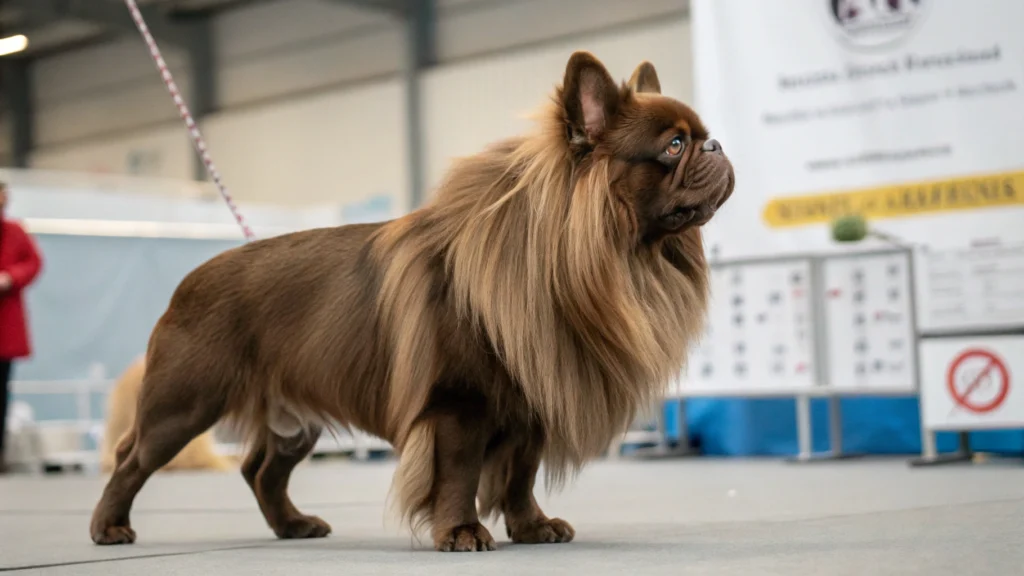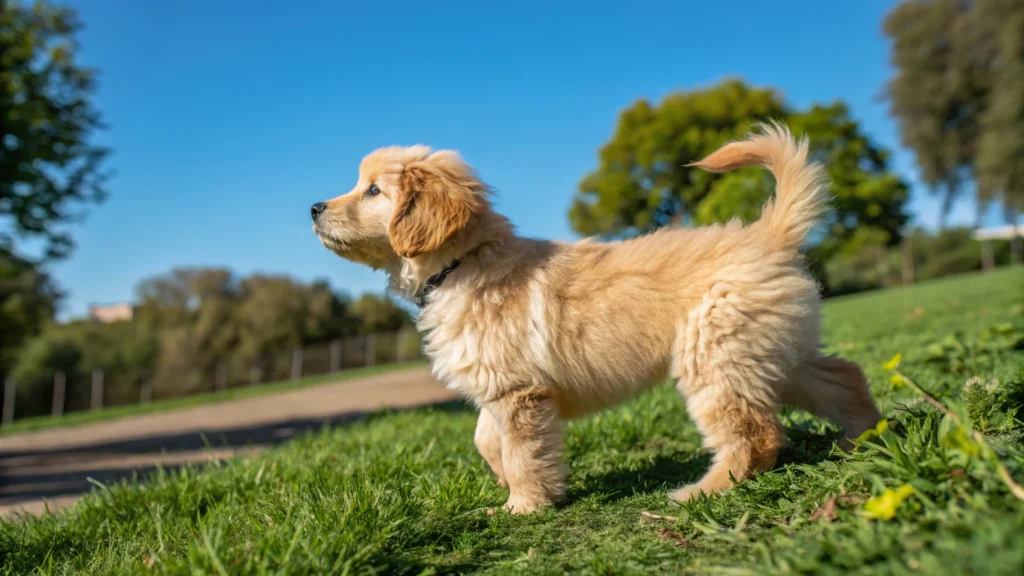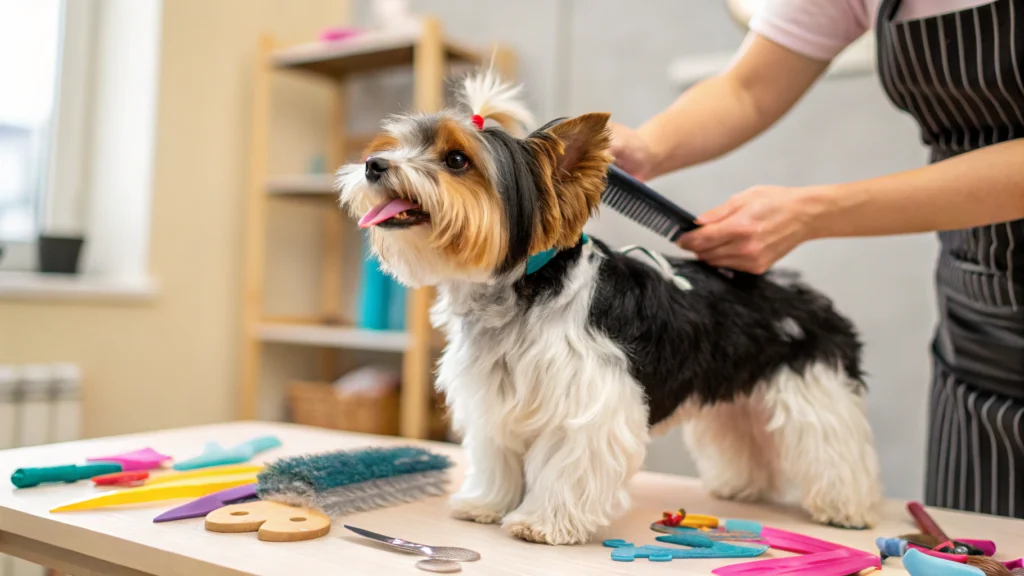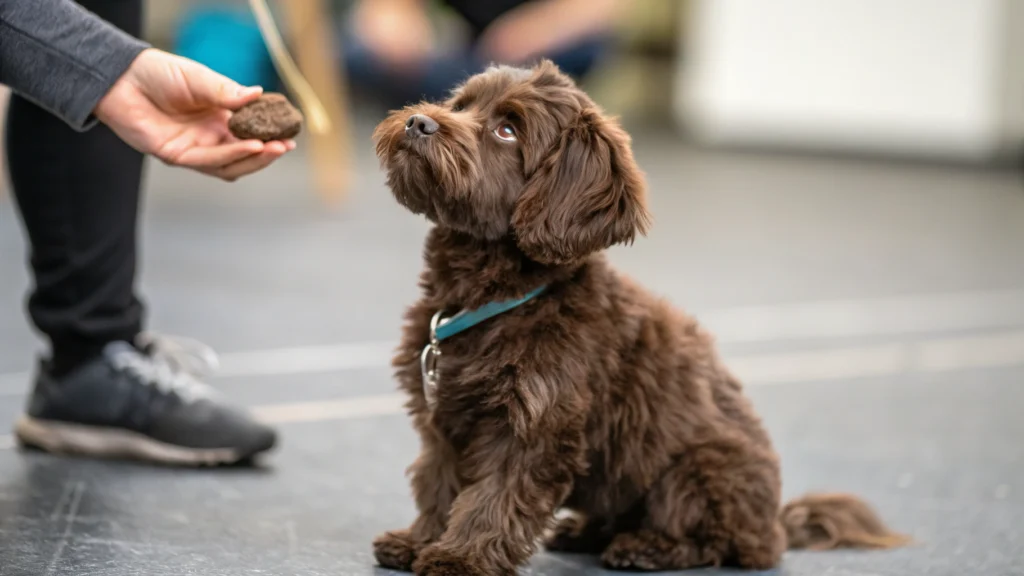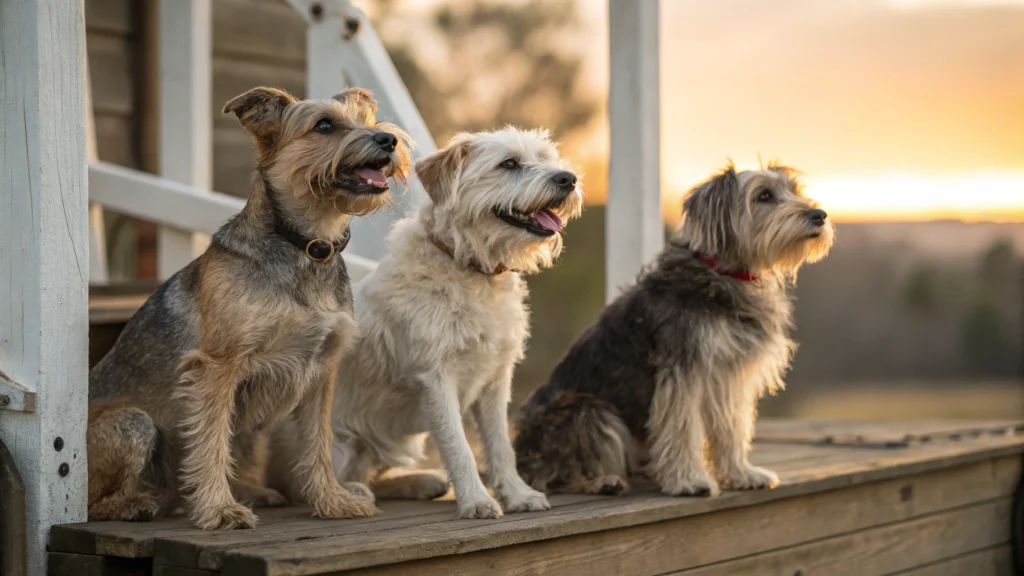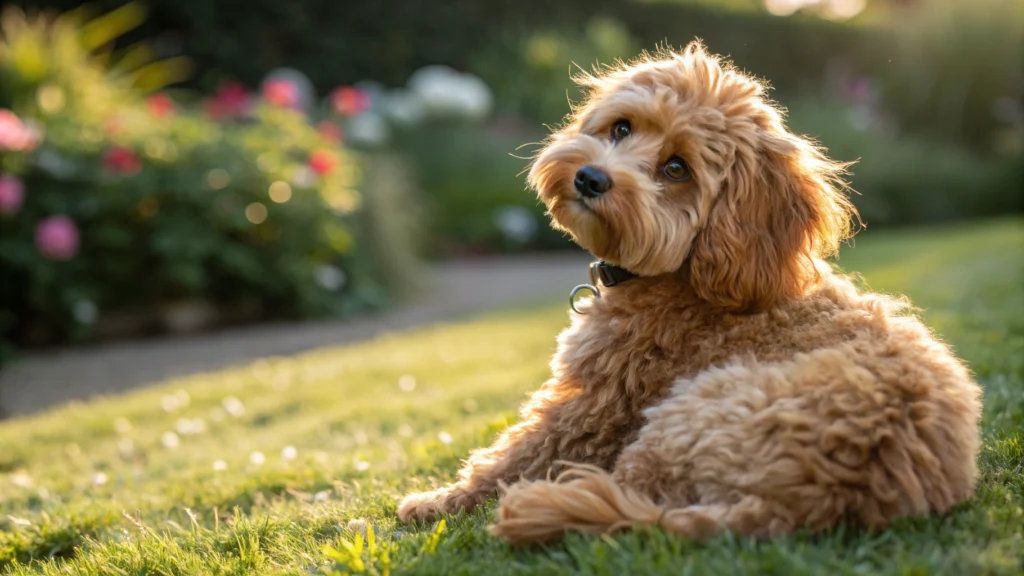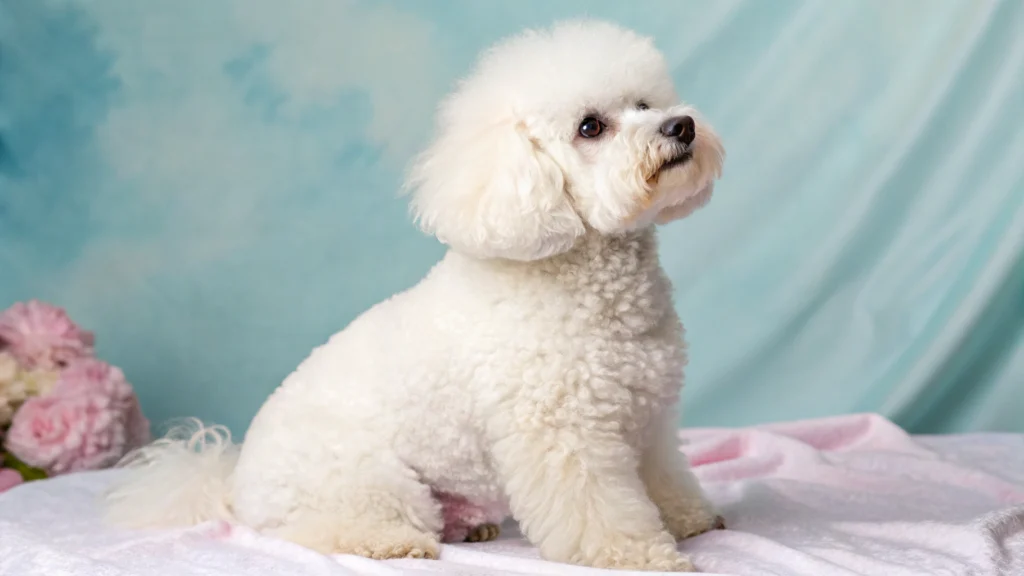
Introduction to the Bichon Poodle
A Hybrid of Charm and Intelligence
The bichon poodle, also known as the “Bichpoo” or “Poochon”, is an adorable combination of two popular breeds: the Bichon Frise and the Poodle. This hybrid is enjoyable and adorable, making the bichon poodle an exuberant combination. While the bichon poodle is a newcomer in the designer dog world, it combines the joyful personality of the Bichon with the smart, intelligent Poodle. The bichon poodle is a versatile family friendly dog. It has a small body, but a great big personality, and makes for the perfect companion dog for a variety of households.
Origin and Popularity
If we go back to discover the ancestry of the bichon poodle, we can justify the intentional crossbreeding that we see today. The first recorded crossbred bichon poodles occurred in Australia in the late 1990s. Breeders were intending to cross a Poodle with a Bichon Frise to create a hypoallergenic dog with an exuberant personality. Immediately, the bichon poodle began to take off; it has become a popular breed around the world.
Nowadays, they continue to grow in popularity among city folks and families with allergies. Overall, the rise of the bichon poodle is a reflection of the rise of designer dogs, which are promoted for their expected traits and their charming personality. As a hybrid, it brings together the best of both worlds: heritage with a modern twist.
Physical Features
Soft Furry Coats and Delicate Bodies
The bichon poodle has soft and curly coat which makes you want to touch them. Usually small to medium-sized, bichon poodles weigh between 6 to 18 lbs and are between 9 to 15 inches tall. Their delicate bodies can make them appear a bit regal with their often big dark eyes. The bichon poodle is spry while also having its sturdy physical build that came from its Poodle lineage. They are small enough that they can comfortably fit in your apartment or large enough to fit in a big house. They are aesthetically pleasing and can easily attract attention from people who pass by them.
Coat Colors and Grooming
Colors vary in all delicious hues—creamy white, apricot, black, and parti-colored. The low-shedding bichon poodle still requires grooming because the coats can become matted. Ideally, you want to brush the coat every day to keep the feel of it luxurious. Professional grooming takes place around every four to six weeks in which the bichon poodle sees a groomer who cares for its coat, whether it be in teddy bear cut or a more sculpted trim. The grooming is not just for looks, it builds a pet-owner bond, keeping the bichon poodle in a treasured family role.
Disposition and Temperament
A Loving and Social Dog
The bichon poodle is a very loving dog. It is a dog that is very friendly. The bichon poodle loves being with people. This breed likes to meet and greet new people. When friends or family come over, likewise, the bichon poodle is happy to see them as well. Unlike some dog breeds that are reserved with strangers, bichon poodles are friendly and open to social calls. Thus, they make excellent companions when you are socializing.
The bichon poodles affectionate temperament includes friendliness with children and other pets in the household which helps keep families harmonious. Being a dog that enjoys being provided attention, bichon poodles can become anxious when they are not adequately given attention.
Intelligence and Trainability
As a cross between a Bichon dog and a Poodle dog, the bichon poodle is confident to learn as the Poodle is an intelligence breed. Being smart, bichon poodles learn rapidly. You will find training to be fun because the bichon poodle can quickly learn any obedience commands, tricks, and complex tasks. Praise, treats, or play, is the most effective form of training prompted through positive reinforcement.
The bichon poodle is an eager-to-please dog, which increases the process of learning. As with all dogs, they can sometimes be obstinate and not listen due to their Bichon characteristics. If you are patient and consistent with the bichon poodles training, then these negative attributes can be unlearned and turned into a good behaved, fun dog.
Health and Longevity
Potential Health Issues
Despite a generally healthy lifestyle, the bichon poodle may genetically inherit some health predispositions. Occasionally you may see patellar luxation, dental issues, or allergies arise in bichon poodles; and be aware of developing eye conditions, such as cataracts. Responsible breeding goes a long way to mitigating health issues, so buying a bichon poodle from a reputable breeder is encouraged. Regular vet check-ups enable early detection of any health concerns, helping to ensure the bichon poodle’s continued health. Being aware of the potential health issues empowers the owner to be proactive in keeping their bichon poodle healthy.
A bichon poodle will thrive as long as you provide a healthy, nutritionally balanced diet for the bichon poodle’s size and energy. Fresh, clean, and accessible drinking water throughout the day is important to prevent dehydration. It is also wise to consider routine dental care (brushing or dental chews) to prevent periodontal disease or tooth loss. Vaccinations and parasite-free (and flea/tick preventative) medications are a necessity for health. These health tips especially mental stimulation (puzzles or interactive toys) and physical health (exercise); when combined with your time, attention, and affection are a recipe for a healthy bichon poodle. A bichon poodle will (often) live to the average range of 12 to 15 years of age.
Living with a Bichon Poodle
Ideal Living Environments
The bichon poodle makes an easy transition to a variety of living environments. An apartment is fine, as long as the daily exercise needs are accounted for. Having a house with a yard to run and play is nice, but as long as the yard is completely secure and fenced, it will be fine as well. This breed does best in an environment full of stimulation and human interaction, so long term separation isn’t ideal.
It works with a variety of living arrangements: families, single parents, and seniors – making it an attractive option to a variety of lifestyles. Also, it has a low-shedding coat, which is beneficial for people who suffer from allergies, making it suitable for a wider range of households.
Exercise and Play Requirements
The bichon poodle may be small in stature, but it has a ton of energy. To keep your bichon healthy, it should be taken for walks daily for 30-60 minutes. To help engage their playful side, daily play with it using fetch, tug or chase games is fun for both the dog and owner. Mental engagement is important to prevent bichon poodle boredom, so find something for it to engage mentally, whether through training or puzzle toys.
Taking the bichon off-leash can be an option in a safe area, allowing to truly let it dig in while playing. These activities not only keep the bichon poodle healthy, but they also allow time for the owner and bichon poodle to bond as partners together, and help engage the bichon poodle’s purpose for being bred: as an active and engaging companion.
Training and Socializing
Effective Training Approaches
The bichon-poodle can be trained effectively in a variety of techniques, as it is smart and eager to please. Lessons should be 10 to 15 minutes in duration to encourage full engagement. Use treats or praise for positive reinforcement. Be consistent with commands and rules; lack of consistency leads to confusion for your pet. Crate training helps with housebreaking, while leash training allows for safe walks.
Gentle redirection is important when dealing with negative actions, such as excessive barking. The bichon-poodle is responsive, making training a fun experience, and it can result in a beloved pet that acts appropriately.
Why Socialization is Important
In short, socialization will lead to a confident bichon-poodle. During the right time of development (3 to 12 weeks) dogs should be exposed to people, pets, and environments a variety of exposure will allow for a more confident pup. Puppies should attend classes, go to the park, have play dates, etc. to ensure positive exposure. A gradual introduction to noises, textures, and routines will prevent your bichon-poodle from being fearful. The bichon-poodle is meant to engage with a variety of people and pets. People who invest time in early socialization will have a well-adjusted and flexible pet.
Grooming and Maintenance
Daily and Professional Grooming are Critical
Bichon-poodle coats require grooming. Your bichon should be brushed at least daily, preferably with a slicker brush to keep a fluffy and avoid any matting. Bichon-poodles should be bathed at least every two to three weeks using dog shampoo to maintain a healthy more skin. Bichon-poodles also require ear cleaning regularly to prevent infection, and nail clipping for comfort. Professional grooming should occur every 6 weeks at a minimum, and professional groomers will shape the coat, and this will assist in preventing bugs, matting, and irritation.
poodle’s distinctive looks and level of comfort. Maintaining the coat
Aside from appearance, coat health is indicative of overall health. A diet rich in proper nutrients can help maintain coat luster. Most veterinarians recommend omega fatty-acid supplements, which help with the coat quality. It is equally important to regularly check for irritation of the skin and parasites. Mats can be painful to the bichon-poodle when they are left for too long, so it is important to address them as soon as possible! A well-maintained bichon-poodle coat not only looks stunning, but it also tells the world that the dog is healthy happy!
Why a bichon poodle?
Ideal Fit for All Lifestyles
The bichon poodle’s adaptability is what makes it just right for all lifestyles. Young professionals appreciate the breed’s low-maintenance shedding. Families appreciate the fun and gentle nature of the bichon-poodle when they play with their children. Retirees value the loyalty and companionship the bichon-poodle provides.
The bichon-poodle is a small dog breed that is well suited in urban and suburban settings, and its playful and friendly demeanor adds enjoyment in any home. The bichon-poodle’s incredible adaptability is a big reason as to why it fits in so well in so many lives as a loyal and devoted companion.
The Fun of Owning a bichon poodle
Owning a bichon-poodle is a journey of fun . The playful quirks can spark laughter, their siding loyalty speaks to our heart. In every-day life, even the simple interactions of taking a walk, playing, or sleeping on the couch together, are bonding moments. This breed has the ability to sense the emotions we show too, and will offer us comfort when we are having a difficult time.
Undoubtedly, the bichon-poodle, through its exuberant personality and devoted companionship, can turn an ordinary day into fun-filled memories! We’ll always remember the it’s the little belly rubs, silly moments, and unconditional companionship.
you may like it
